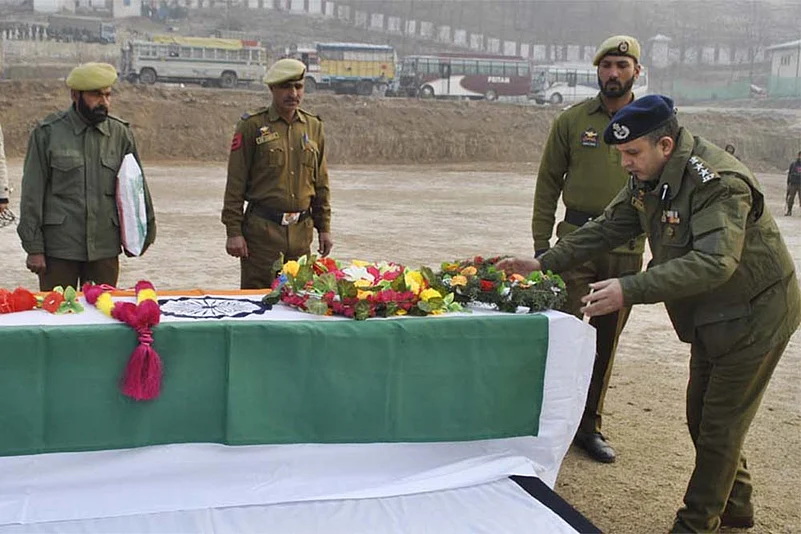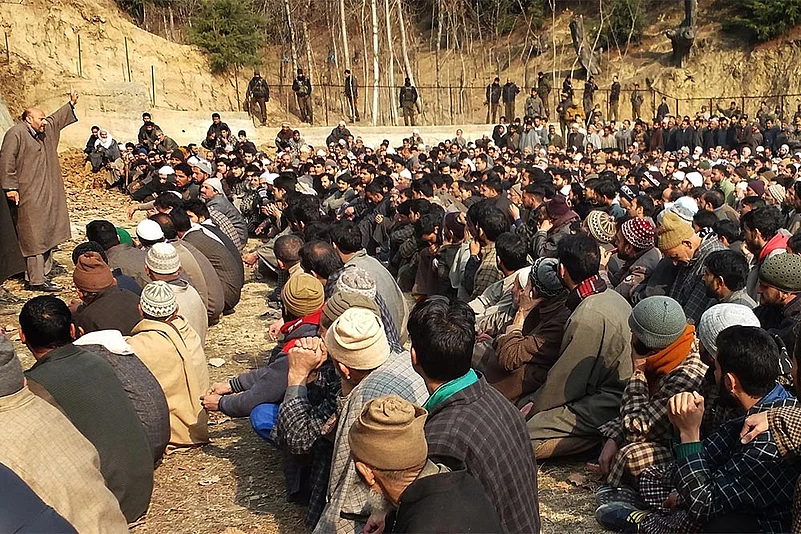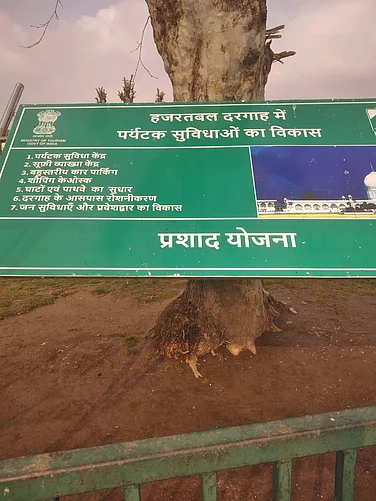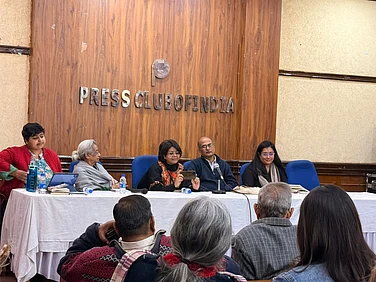Ringed by towering mountains, Mawar is a village on the foothills of the Shamsbari range in Jammu and Kashmir. Located along a key route that militants have often used to cross the Line of Control (LoC), this village in Kupwara district, 90 km northwest of Srinagar, was witness to two funerals—one in 2015 and the other on the first day of this year—that reflect the complexities of Kashmir’s long war. In 2015, villagers poured into the streets to mourn the death of the war’s longest-serving militant, Tariq Ahmad Mir.
At Tariq’s funeral, independent MLA Engineer Rashid, also from Mawar, said the sacrifices of militants could not be ignored and asked the Indian government to “respect the sacrifices of Kashmiris”, introspect its Kashmir policy and acknowledge the dispute. And on January 1 this year, a J&K Police constable hailing from Mawar, Abdul Karim Sheikh (also known as ‘Shaad’, the happy one), fell to militants’ bullets. This time, in his speech at the policeman’s funeral, Rashid accused New Delhi of facilitating the killing of innocents in Kashmir by avoiding the resolution of the 70-year-long political dispute over Kashmir.
That someone like Rashid would mourn a dead policeman as well as a slain militant is the new normal in the ‘mainstream’ political approach towards the competing realities of the region. In fact, Chief Minister Mehbooba Mufti is widely regarded as a pioneer in this. When she was an Opposition leader, she would visit the houses of militants who were killed and mourned their deaths. In 2002, when her party, the Peoples Democratic Party (PDP), won 16 of the 87 seats in the J&K assembly, it asked the militants to give up the gun as they now had “16 representatives in the assembly to plead their case”.
The tactic caught on outside the PDP too, even with a legislator like Ghulam Hassan Mir of the J&K Democratic Party Nationalist, who was once described by former army chief General V.K. Singh as a “patriotic Indian” and “a god”, but went on to offer prayers at a militant’s grave in Tangmarg. Similarly, in the ongoing assembly session in Jammu, Showkat Ahmad Ganai of the National Conference (NC) described militant commander Burhan Wani as a martyr.
Rashid clarifies that attending the policeman’s funeral shouldn’t be seen as an expression of any “anti-militancy” sentiment. “The funeral shows empathy towards the local policeman, but we believe India is responsible for every killing in Kashmir, including the killings of policemen by militants,” he says. “This is so because it is India that is hindering the resolution of the Kashmir conflict.”

Sheikh was born to one of the poorest families in Mawar and lived in a wooden house surrounded by brick houses. He was hired as a constable in 2014 after serving as an SPO (Special Police Officer) on a monthly honorarium of Rs 3,000 for nine years. On January 1, the 35-year-old was manning a checkpoint at Chogal village with three other policemen when they stopped a vehicle for a routine search. According to the police, the unknown militants, who were inside the load carrier, fired one bullet at Sheikh’s chest and fled away. He passed away on the way to the hospital.
Killing of policemen is not unusual in Kashmir. Militants killed eight of them last year. What was different about Sheikh’s death is that hundreds participated in his funeral (5,000, according to the police). This happened at a time when funerals of militants and other Kashmiris killed by security forces are invariably attended by mourners in huge numbers. For example, on July 8 last year, nearly 1 lakh people mourned for Burhan Wani at various funerals organised for the Hizbul Mujahideen commander.
“Sheikh was a gentleman,” says a neighbour, who had come to Sheikh’s house to condole his death. “He didn’t harm anyone or make money by foul means. We liked him.” Expecting a fourth child, Sheikh’s wife Dilshada, three years younger than him, has been in hospital since the day after Sheikh’s death. With her are her three children, aged two, five and seven. “The children were in panic,” says constable Sheikh’s brother-in-law Muhammad Abdullah Sheikh. “Their father’s death made them worry about something bad happening to their mother. So we allowed them to be with their mother.”
When Rashid speaks, sometimes he sounds more separatist than the separatist leaders. A distant cousin and next-door neighbour of constable Sheikh, Rashid says army personnel had forced him in 2003 to work as a “bounded labourer” for them. He won the 2008 assembly election from the Langate constituency on an independent ticket, and has since been raising his voice on human rights violations by the security forces.
The MLA, who believes the Kashmir dispute cannot be resolved without direct talks between New Delhi and the United Jihad Council (UJC)—an amalgam of 13 militant groups led by Syed Salahuddin—had moved a clemency resolution in the assembly in 2011, for Afzal Guru, who was then on death row in the Parliament attack case. The resolution didn’t come up for debate as the Congress and the BJP joined hands to scuttle it.
In his speech at the constable’s funeral, he asked whether the killing of local policemen helps in addressing the cause of Kashmir’s independence. “The majority of policemen are local youth, whose sentiments and aspirations are no different from the rest of the Kashmiri nation,” he said, appealing to the UJC to “understand the compulsions of common policemen”. One lakh men of the J&K Police cannot be isolated, Rashid wanted the UJC to keep in mind. Indeed, the police are one of biggest employers in the state, with the force strength growing exponentially since 1990—from 18,000 personnel then to over 1.2 lakh now.
Rashid points out that many cops lost their jobs and some their lives for supporting the people’s resistance against the government. In fact, in the initial years of the uprising in the 1990s, the police were seen as being sympathetic. 1n 1993, the Indian Army put down a police mutiny in Srinagar, which ended with the arrest of hundreds of policemen.
The picture has changed somewhat since 1995, when the J&K government formed the Special Operations Group (SOG)—a counter-insurgency force that drew its members from the state police. The SOG killed or arrested hundreds of militants and became a dreaded force, widely accused of human rights violations, including custodial killings, torture and fake encounters. In 2002, after the then Mufti Mohammad Sayeed government disbanded the SOG, its personnel were absorbed into the main police force. Human rights groups, though, allege the SOG continues to operate in the Valley with impunity.
In recent years, many policemen have ended up joining various militant groups. One of them, Naseer Ahmad Pandith, who joined the Hizbul and was said to be close to Burhan, was killed in an encounter in south Kashmir’s Shopian district on April 7 last year. Rashid visited Pandith’s family in May. In March 2015, Pandith, who was working with the J&K Armed Police since 2007, went missing with two AK-47s from the guard room of the residence of a J&K minister where he was posted.
Indeed, Mawar—where villagers mourned the slain constable this year and, earlier, in August 2015, the militant Tariq, who drowned in a river while being chased by the police—reflects the complexity of Kashmir’s politics. Tariq had joined the Hizbul in 2001 and had a role in keeping the insurgency alive in a period marked by Pakistan’s decision to scale down its support in 2003 and the number of militants falling to double digits for the first time in 2012. He was said to have become a deputy commander of the Lashkar-e-Islam, which drew attention after the attacks on telecom towers across the Valley in May 2015.
After Tariq’s killing, Rashid had said, “We must introspect why the masses, particularly the people of Mawar were in mourning after the militant’s death even while the army, police and other security organisations were celebrating it.”
By Naseer Ganai in Mawar


























